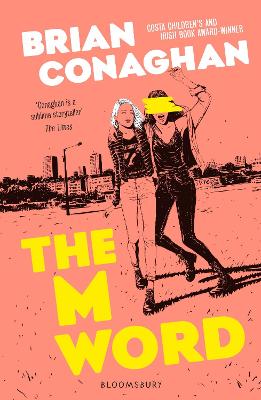Reviewed by Kelly on
Attending her counselling sessions isn't any better, Maggie scoffing at the new age mediation and loved up approach of Anna, her grief counsellor. Maggie's coping, barely. So when her tuck shop lady mum loses her job and sole income, Maggie watches her mum deteriorate much in the same way as Moya did. She chain smokes, has boarded herself inside and pitches a fit when the curtains are drawn, willing to clobber Maggie at the mere suggestion of opening a window. Maggie's mum has depression and the bad days are outweighing the good lately, which is driving Maggie deeper into a pit of grief and self harm.
Maggie's narrative is harrowing, she's trying to gather her life together after the death of her best friend. She hears Moya speaking though and old tattered teddy bear she carries as a protective shield. It's always been Maggie and Moya against the world but while Moya cycled through skint, tracksuit clad boyfriends, Maggie knew the only way to escape their suburban shithole was to make something of her life.
As Maggie is accepted into art school, Moya continues her snarky commentary by invading Maggie's thoughts. When she's placed in a group assignment with Plum, her boyfriend and Davis, who Maggie begins crushing on, Moya is there, egging her on, giving her useless advice but she helps Maggie to feel not so alone. The night that Moya died, Maggie begun to self harm as a distraction from the pain of losing her friend. As her mum loses her job and with little welfare to make ends meet, Maggie's mum locks herself away in a house of stale cigarette smoke and trashy reality television. When the ache becomes too much, Maggie cuts.
Although we only see Moya through Maggie's perception, her character is larger than life. She's rough around the edges and wouldn't hesitate to knock you into next week but she loves Maggie, hiding her feelings between crass jokes and snarky comments. Fractures start to form in Moya's character as Maggie considers applying to art school. Moya felt as though she's being left behind, picking up with another tracksuit clad tosser who treats her like shit. Moya wants to be loved, deserved to be loved and assholes seemingly used and abused her, her casual boyfriend posting photos on Instagram without her consent, the comments and abuse coming thick and fast. Moya tried shaking it off, pretending she didn't care. She did. Maggie blames herself, if only she'd been there, if only she said something, if only Moya had still relied on her.
The storyline is confronting and packs an emotional punch. Poverty, suicide, depression, grief, toxic relationships, abuse and self harm. Many of these issues go hand in hand and Brian Conaghan has skilfully layered them throughout the storyline to create genuine characters who endure and survive what are ultimately shit circumstances, illness and hardship. They're flawed, genuine and most importantly, relatable. I loved the bright moments in Maggie's life, when she remembers Moya, sitting in the bath together removing their public hair, Moya's politically incorrect commentary, meeting Davis, her new and very unassuming friend Plum wanting to call their band The Flaps, Maggie and Davis setting her mum up with a man without her knowledge and while of course I don't condone catfishing, the misguided experience brought Maggie and Davis together.
This is by no means a love cures all storyline, actually love just makes Maggie's life more complicated, it drove home the message of how important emotional support can be. I loved grief counsellor Anna. Even as often as Maggie scoffed at her methods and lashed out at her, she was patient and showed an incredible amount of kindness. She also wasn't afraid to tell Maggie a few home truths when push came to shove.
It was bloody brilliant. I'm always a little sceptical when it comes to male authors writing about the teen girl experience, yes, yes, sexism and that but it felt incredibly authentic. Maggie could be a girl that lived next door, sat behind me in class, she's a girl I would have been friends with, I even see parts of myself reflected in Maggie.
Borrow a copy, buy a copy and ditch that tracksuit clad boyfriend and read it. While you're in the bath removing your pubic hair if that's you're thing. This is what young adult is about.
Reading updates
- Started reading
- 3 February, 2020: Finished reading
- 3 February, 2020: Reviewed
